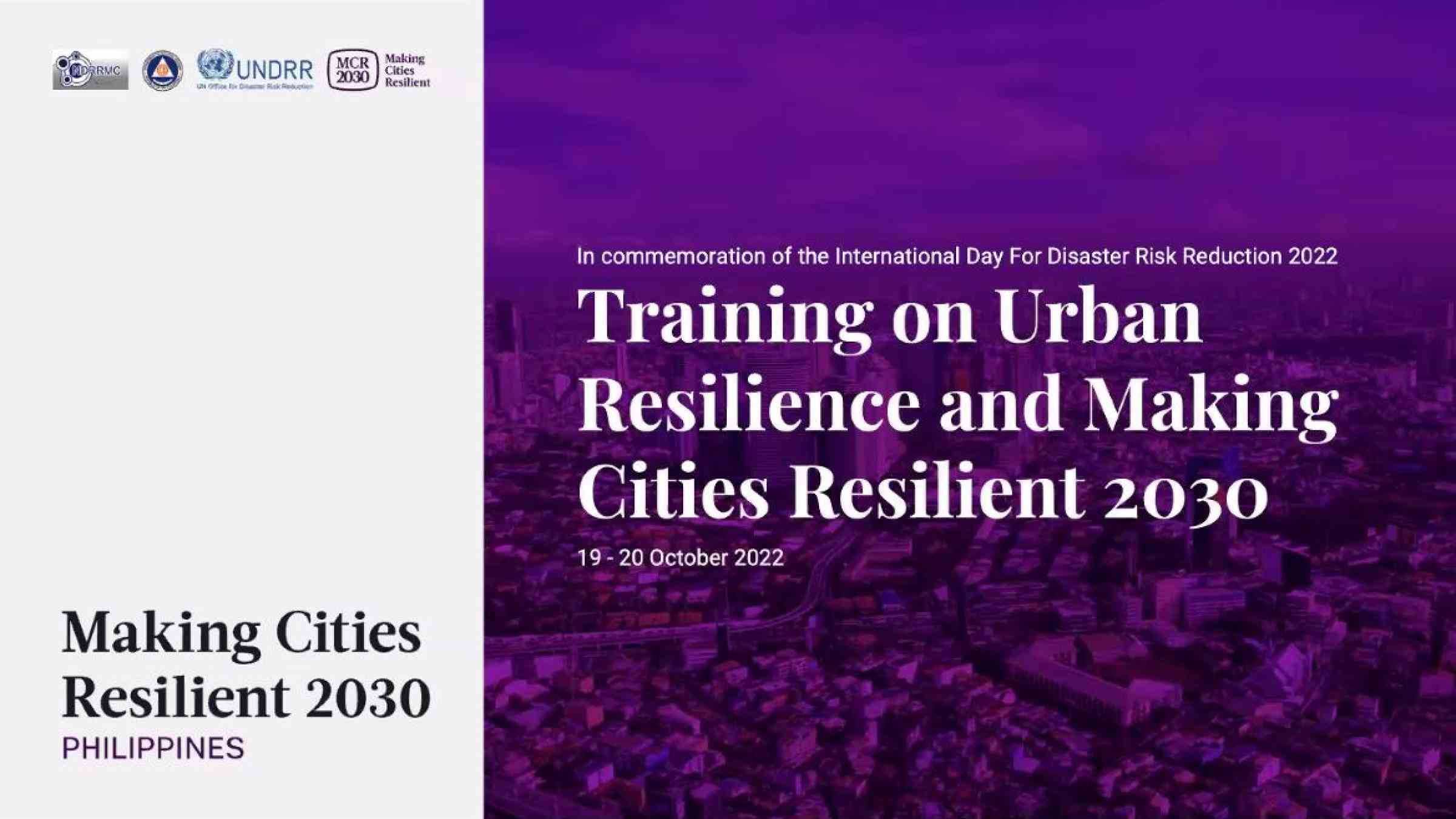Training on Urban Resilience and Making Cities Resilient for the Philippines

- English
Event Date, Time & Venue
Date: 19-20 October 2022
Time: 14:00-17:00 hrs. (GMT+8).
Venue: Online.
Organizers
- UNDRR Global Education and Training Institute (GETI)
- UNDRR Regional Office for Asia-Pacific (ROAP)
- Making Cities Resilient 2030 (MCR2030)
- Office of Civil Defence, the Philippines (OCD)
Course Background
The Sendai Framework for Disaster Risk Reduction 2015-2030 highlights the role of state government in empowering local governments in disaster risk reduction (DRR). Local governments are on the ‘frontline of opportunity’ to reducing impact of disasters – keep people out of poverty; protect hard-earned local development gains; and enable municipalities to become more inclusive, safe, resilient, and sustainable. Challenged by climate emergency, pandemic, and other shocks and stresses, resilience building can no longer be a stand-alone issue and must take into consideration the inter-dependencies between sectors, the interconnectedness of socio-economic factors, and the complexity of hazards. Understanding risks, both existing and potential ones, must become an integral part of urban resilience and sustainable development. Local governments are often in need of guidance and support from national government especially in providing enabling environment and strengthening capacities in various areas.
The Making Cities Resilient 2030 (MCR2030), a 10-year global partnership accelerating local resilience, provides a clear 3-stage Resilience Roadmap guiding cities and municipalities towards taking a long-term and continuous approach to resilience investments, from awareness raising to enhanced strategic planning and taking a whole-of-society approach to implementation. In October 2021, the Philippines Government led by the National Disaster Risk Reduction and Management Council (NDRRMC), in partnership with the Office of Civil Defense (OCD), the Department of the Interior and Local Government (DILG), and the Union of Local Authorities of the Philippines (ULAP) launched MCR2030 Philippines to strengthen engagement with local government units (LGUs) on disaster resilience and is institutionalizing MCR2030 to support the roll out of the Philippines’s national disaster risk governance agenda. As of September 2022, 65 LGUs and 19 organizations based in the Philippines have joined MCR2030, demonstrating great interests in urban resilience and commitments to making their cities and municipalities resilient and sustainable.
Course Objective
This course serves as an introductory training on urban and local resilience for OCD, local government unites, and affiliated organizations. It aims to:
- Increase the knowledge and capacities on disaster risk reduction and resilience at the sub-national level
- Provide approaches and tools to further support resilience building at the local level and enhance interaction with LGUs
- Facilitate discussion and forward planning on sub-sequent capacity building opportunities for LGUs
- Strengthen MCR2030 support in the Philippines’ national agenda on urban resilience
Expected Outcomes
By the end of this training, participants shall be able to:
- Describe urban resilience and impact of disasters on cities and municipalities
- Explain key approaches to guide LGUs in taking the long-term approach to reduce risks and strengthen resilience
- Provide examples of useful tools that can help LGUs in increasing capacities to access finance
- Use MCR2030 dashboard to access useful knowledge, toolkits, and services available for the Philippines LGUs in various thematic areas of interests, to enhance collaboration with partners, and to facilitate experience sharing and demonstrating achievements by LGUs with the global network
- Facilitate sub-sequent capacity building programmes to enhance LGUs in urban resilience building
Structure and Methodology
The training will be fully online facilitated by trainers from UNDRR GETI and MCR2030 partner organizations. The training will include presentations, quizzes, exercises, and discussion. Q&A will be facilitated throughout the training period.